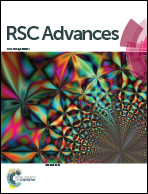Occurrence of disinfectant-resistant bacteria in a fresh-cut vegetables processing facility and their role in protecting Salmonella enteritidis†
Abstract
Chemical disinfectants are widely used to control foodborne pathogen contamination in fresh-cut vegetables (FVs) processing facilities. In this study, we investigated the disinfectant-resistant bacteria in a FVs processing facility and evaluate the effects of these bacteria on Salmonella enteritidis biofilm formation and disinfectant resistance. The disinfectant-resistance profiles were determined using 0.02% sodium hypochlorite (NaClO), 0.2% benzalkonium bromide (BAB) and 2% hydrogen peroxide (H2O2) solutions. The results showed the high occurrence of disinfectant resistant bacteria in the FVs processing environment, especially in the clean area. All isolates showed planktonic susceptibility to H2O2 and BAB, while the Gram-positive isolates were specifically resistant to NaClO. Isolates with biofilm-forming ability showed resistance to tested disinfectants. Disinfectant resistance of S. enteritidis was not significantly enhanced in most of the mixed-species biofilms, except for Bacillus paramycoides B5 which not only increased the biomass but also enhanced the survival ability of the Salmonella under NaClO treatment. Increased biomass and compact biofilm structures were observed in mixed-species biofilms by scanning electron microscopy (SEM). This study provides new insights into the disinfectant-resistant bacteria from food processing facilities and highlights their relevance for foodborne pathogen contamination.



 Please wait while we load your content...
Please wait while we load your content...